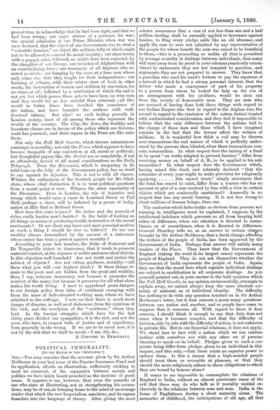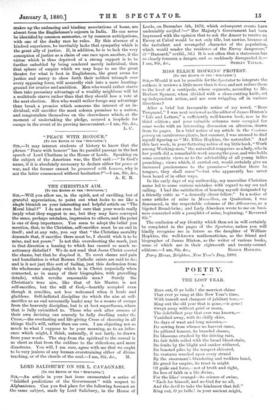POLITICAL IMMORALITY.
(TO THE EDITOR OF THE "SPECTATOR.") SIR,—You may consider that the account given by Sir Arthur Hobhouse in your last issue of the Famine Insurance Fund and its application, affords an illustration, sufficiently striking to need no comment, of the separation between morals and politics we have lately heard preached as the doctrine of good- sense. It appears to me, however, that even the remarks of one who aims at illustrating, not at strengthening his accusa- tions, may be of use, in bringing home to the mind of an average reader that which the new Imperialism sanctions, and its organs translate into the language of theory. After giving the most solemn assurances that a sum of not less than one and a half million sterling shall be annually applied to insurance against. famine, to ffing every pledge aside like an old almanac, and apply the sum to uses not admitted by any representative of the people for whose benefit the sum was raised to be beneficial to them,—this is a proceeding so unlike all that is permitted by average morality in dealings between individuals, that many will turn away from its proof in your columns practically uncon- vinced by statements they are not tempted to question, and. arguments they are not prepared to answer. They know that a guardian who used his ward's fortune to pay the expenses of a lawsuit in which he had a strong personal interest, that the- debtor who made a conveyance of part of his property to a person from whom he looked for help on the eve of an arrangement with his creditors, would be shut out from the society of honourable men. They see men who- are accused of having done both these things with regard to our Indian Empire (the first in regard to the Afghan war, the second in regard to the remission of the cotton duties) treated with undiminished consideration, and they find it impossible to believe that the only difference between the actions laid to the charge of these men and those which I have imagined consists in the fact that the former affect the welfare of millions. It is wonderful how thick a veil may be thrown over transactions the real nature of which is perfectly under- stood by the persons thus blinded, when these transactions con- cern communities. In what respect does the raising of a fund to be spent "on works adapted to prevent famines" differ from receiving money on behalf of A. B., to be applied to his sole necessities ? In what respect does the Government which, having raised this fund, and solemnly declared "that the- estimates of every year ought to make provision for religiously
applying this sacred trust," simply announces that the fund has ceased to exist, differ from a trustee who has no- account to give of a sum received by him with a view to certain objects which are confessedly unattained ? Assuredly in no- respect that has any moral bearing. It is not less wrong to- cheat millions of human beings, than one.
The confusion which hides truths so obvious from persons not wanting in intelligence must be explained, I suppose, by the intellectual indolence which prevents us all from keeping hold either of difference, when our attention is directed to resem- blance, or of resemblance, when it is directed to difference.. General Strachey tells us, as an answer to certain charges brought by Sir Arthur Hobhouse, that a fiscal change, affecting the welfare of the people of India, has been approved by the Government of India. Perhaps that answer will satisfy many readers of the Times. They know that the Government of England (taking the word. in its largest sense) represents the people of England. They do not ask themselves whether the- Government of India represents the people of India. Again, they see that the moral laws which regulate individual dealings are subject to modification in all corporate dealings. As you yourself pointed out, in your answer to the bald cynicism which the Pall Mall Gazette, in my opinion unsuccessfully, attempts to explain away, we cannot always keep the same absolute cer- tainty of national, as of individual identity. The difficulty has nothing to do with any question touched on in Sir Arthur
Hobhouse's letter, but it does concern a great many questions between one nation and another, and so people have come to suppose that it concerns all. With regard to those it does concern, I should think it enough to say that duty does not cease when it becomes complex, and that the difficulty of decision, side by side with the difficulty of action, is not unknown in private life. But in our Imperial relations, it does not apply.. We stand face to face with a nation which we can confuse neither with ourselves nor with any other set of persons claiming to speak on its behalf. Pledges given to such a cor- porate being differ from pledges given to an individual in this respect, and this only,—that there exists no superior power to enforce them. Is this a reason that a high-minded people should treat them as revocable at pleasure, or that they should the more religiously adhere to those obligations to which they are bound by honour alone?
It seems to me impossible to contemplate the relations of England to India, without an almost passionate sense of the evil that those may do who talk as if morality resided ex- clusively in the relations between man and man. India is the home of Englishmen during a short maturity alone. The memories of childhood, the anticipations of old age, all that makes up the endearing and binding associations of home, are absent from the Englishman's sojourn in India He can never be identified by common memories, or by common anticipations, with one of the dusky race he rules. By this absence of a kindred experience, he inevitably lacks that sympathy which is the great ally of justice. If, in addition, he is to lack the very conception of justice as a, claim of one race upon another, if the virtue which is thus deprived of a strong support is to be further enfeebled by being rendered merely individual, then that sphere of empire which we may hope to see the great theatre for what is best in Englishmen, the great arena for justice and mercy to show forth their noblest triumph over -every opposing force, will assuredly sink into a mere hunting. ground for avarice and ambition. Men who would rather starve than take pecuniary advantage of a wealthy neighbour will let a multitude starve rather than that they should lose a vote at the next election. Men who would rather forego any advantage than break a promise which concerns the interest of an in- dividual, will sacrifice the most solemn promises to a nation, and congratulate themselves on the shrewdness which, at the moment of undertaking the pledge, secured a loophole for escape in the event of its proving inconvenient. —I am, Sir, &c., L. C.











































 Previous page
Previous page